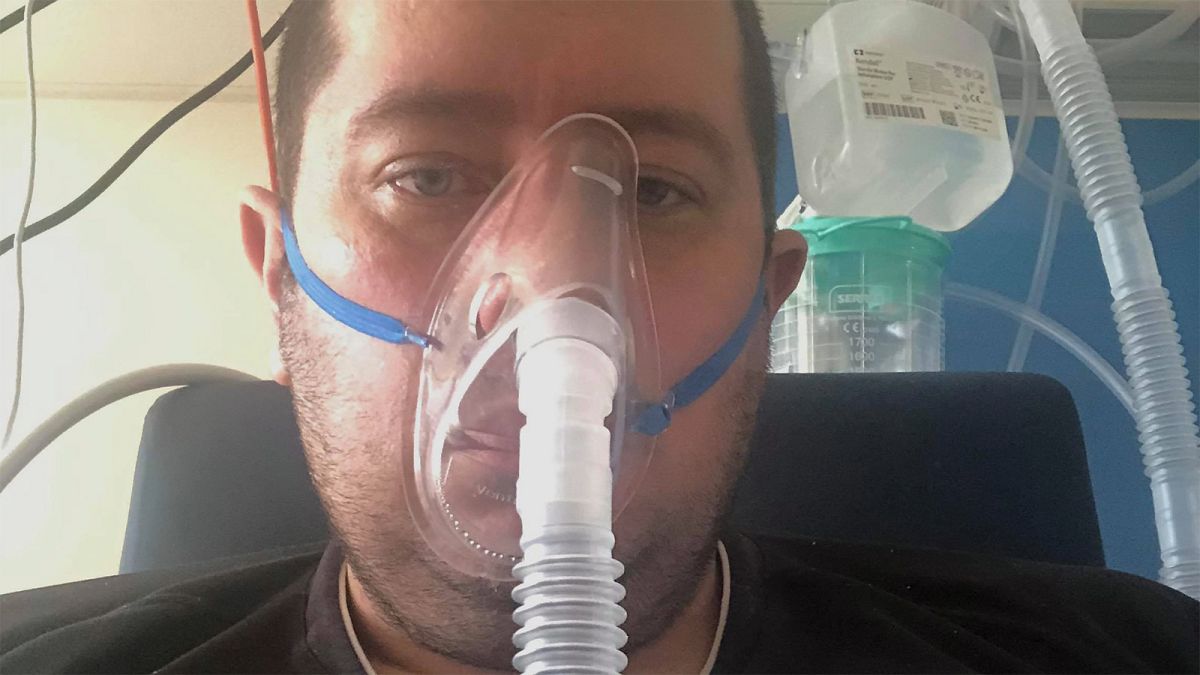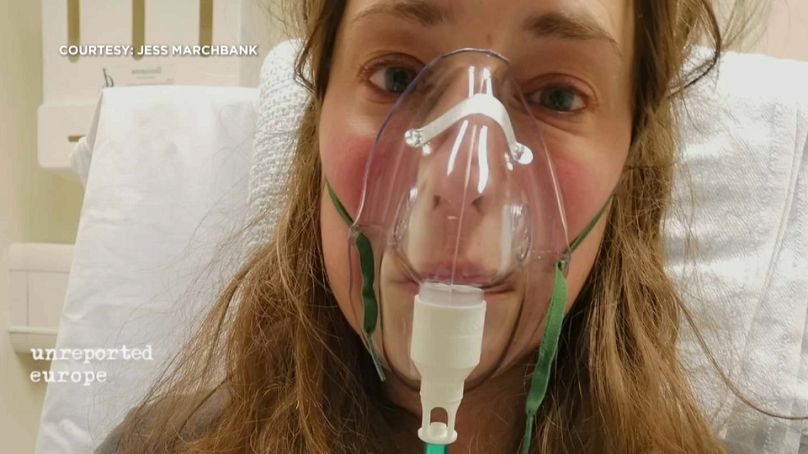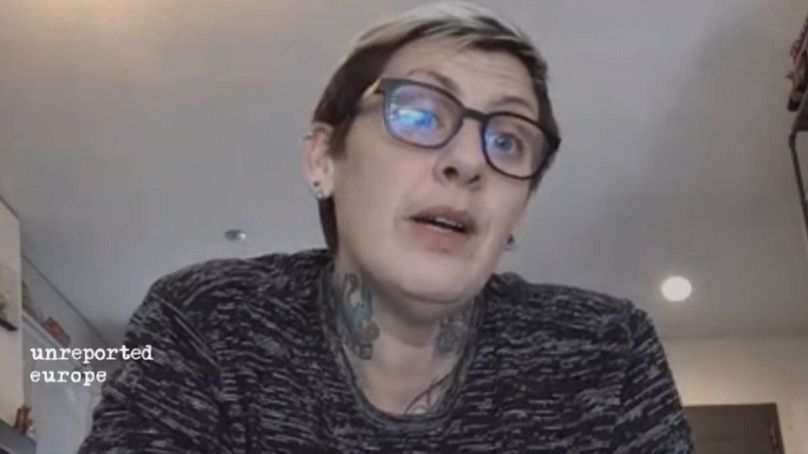Covid-19 death tolls are continuing to rise throughout the world, but Unreported Europe spoke to survivors of the virus to learn about the new perspectives and messages they have after their experience.
Throughout the world, the coronavirus death toll is continuing to rise. But many of those who became infected have survived and gone on to make a full recovery.
I spoke to several people from their confinement across Europe, who told me about life with the virus - and their new perspectives afterwards.
Under attack
Jess Marchbank is a nurse from Devon in southwest England. Her first sign of infection was a mild sore throat on a Friday evening. Her symptoms soon developed and she remembers the extreme discomfort that came with full-blown infection:
“The pain was just excruciating. My joints just felt like they were on fire! That, combined with the pounding headache and just the pure lethargy. I couldn't roll over, the pain was too much to roll.”
Matt Dockray, a venue manager working in London describes what happened in hospital after the infection was confirmed:
“You get taken into this isolation room and everyone comes in, in hazmat protective suits. So they hook you up to every machine and they look at your vital signs.
"And at that point, they said that my body wasn't not absorbing the right level of oxygen, that it was critically low. My right lung had collapsed and my left lung wasn't doing great at all.”
Josua Dopkowski, a Lyon-based lecturer says it was a very unsettling experience, made more bearable by his young daughter Ayla being with him:
“To be in that situation when you're sick with something that's potentially deadly is outright terrifying. So I think for me as a parent, having Ayla around, I had to think about this person that needs to be taken care of. (But) she actually helped me quite a bit!"
Kike Mateu is a Spanish sports journalist who found the whole experience gruelling:
"The disease progresses very slowly and you just don’t know when it will be over.
"The most difficult thing mentally is to accept that you just don’t know how long you’ll have the coronavirus for. In the end, I was affected for 31 days!”
Lucie Laville is a resuscitation nurse working at Geneva University Hospital in the Covid-19 unit. She found it frustrating when she had to be quarantined:
“For me, what was really the most difficult thing was to know that my help was needed in the resuscitation department and that I was confined at home, without symptoms and not being able to do my job.
"It is hard for my colleagues and I. The working conditions are very challenging, but it's our job!
"The night that we had a death, It was an elderly gentleman. He was my patient. We stayed with him and held his hand.
"We told him that his family would have liked to have been there, but that they couldn’t be, it wasn't because they didn't want to be.
"And at least, we were with him for the last five minutes of his life. Because that's really hard. "
Saved
Kike Mateu describes the emotions when he realised he was cured:
"It was extraordinary, so moving, so memorable! At last, I would be able to see my family after nearly a month. It was an incredible moment. I will never forget it.”
Jess Marchbank was similarly emotional when she pulled through:
"I felt really blessed, really privileged to be that positive statistic. And my son said: 'Gosh, this is the best present ever, Mummy! It’s a better present than Lego!'
"So yes, it was really special. I will cherish that hug forever. It was amazing!”
Matt Dockray sounded a note of caution, however:
“You don't know what the long term effects are. You don't know what it means. Can you catch it again?
"But I always stay positive. And every time I have a down moment, I go back to that and reset myself and realise where I am now.”
Lessons Learned
But Matt - and indeed all of the people I spoke to - said there was a positive side to the experience.
Matt said it made him think about the things he wanted to do:
"Every little thing that you've always pushed aside or not done or haven't cared about, you suddenly want to do.
"You want to change, and become this better person for other people and those around you. Not from a selfish point of view, but (because) you want to make a difference.”
Kike said the experience had deepened his appreciation of the medical staff:
"The people working in hospitals are wonderful. Those people, the way they work, they are now in my heart and they will be forever.
"That’s a wonderful upside of having lived with the coronavirus.”
Guglielmo Schinina, Head of Mental Health at the UN Migration Agency, reflected on what the less priviledged have to go through:
"I thought about how lucky I'd been and how much more difficult it must be for those who might not have access to healthcare at all, such as migrants either in irregular situations, or migrants who are simply afraid of going to health services.”
Laurence Rétaméro is an artist based in the south of France. She spent five nights in hospital followed by isolation at home. She says the support from her friends and relatives, as well as unknown friends on social media, helped immensely:
“I felt buoyed up by them, carried by my relatives. I really felt that they were a positive energy force for me. "
Joshua Dopkowski's 8 year old daughter was grateful to the people who helped her father and she while they were isolating:
"I think it's nice that other people out there did stuff like grocery shopping, leaving their houses, to do stuff for us. They used their time and also risked getting the virus.
"And if they asked us to do that for them, we would say yes, because they did it for us.”
Ranim Aldaghestani, a Syrian journalist based in France spoke of her relief and her hope that things will improve:
"Our planet found its breath again after the various confinement measures throughout the world. After the closure of many factories, of airports.
"All these things have drastically reduced the Co2 emissions which pollute our air. And all this teaches us that we must preserve our common home."
Messages to the world
Without hesitation, Lucie Laville says her one message to people would be:
"Stay home!"she exclaims. "At our individual level, it’s the only thing we can do to stop it. because I don’t want to have to ask someone: 'Do you prefer us to intubate your dad or your mum? Because I only have one tube. I have two patients and one tube. I have one ventilator.
"‘Who do we chose ? Your dad ? Your mum ? Who do you prefer ?’ And that’s horrible."
Christos Kellas is a Greek MP and also an anaesthetist. He was among the first confirmed cases of Covid-19 in his home country:
“This message comes from a person that fought the coronavirus and won after a very difficult battle: we need to stay at home!
"Maybe someone doesn’t want to protect themselves, maybe someone wants to harm themselves, but he doesn’t have any right to harm public health, to harm society.”
Henri Lapierre is 82 and a retired entrepreneur. He spent a week in hospital in Marseille as part of his recovery. He said he wanted to convey a message of hope:
"It’s possible to get through the disease and return to good shape. So that’s what’s really important. Not to be fatalistic and think that everything’s over.
"That’s not true. I think it’s important to keep a positive mindset. And that helps in getting back to a normal life.”
Laurence Rétaméro agrees:
"Boosting our energies, boosting our immunity through a positive mindset, as much as we can, is crucial I think.", she said, adding: "Thank you for this positive report, it's necessary. It must be repeated. We will get through this, of course we will.”
Guglielmo Schinina thinks we need to broaden our outlook to prevent this happening again:
"We need to think not only about ourselves, not only about our own countries, but about the world as a whole. Otherwise, these things will just keep happening. We should work together on such things.”
Joshua Dopkowski thinks, ultimately, that the world needs to slow down:
"We need to slow down. We can still communicate, we have the blessing of communicating through digital technology across the world. We don't need to move as fast, to travel as much and consume as much.”And 8 year old Ayla gleefully concluded: "I agree!".


